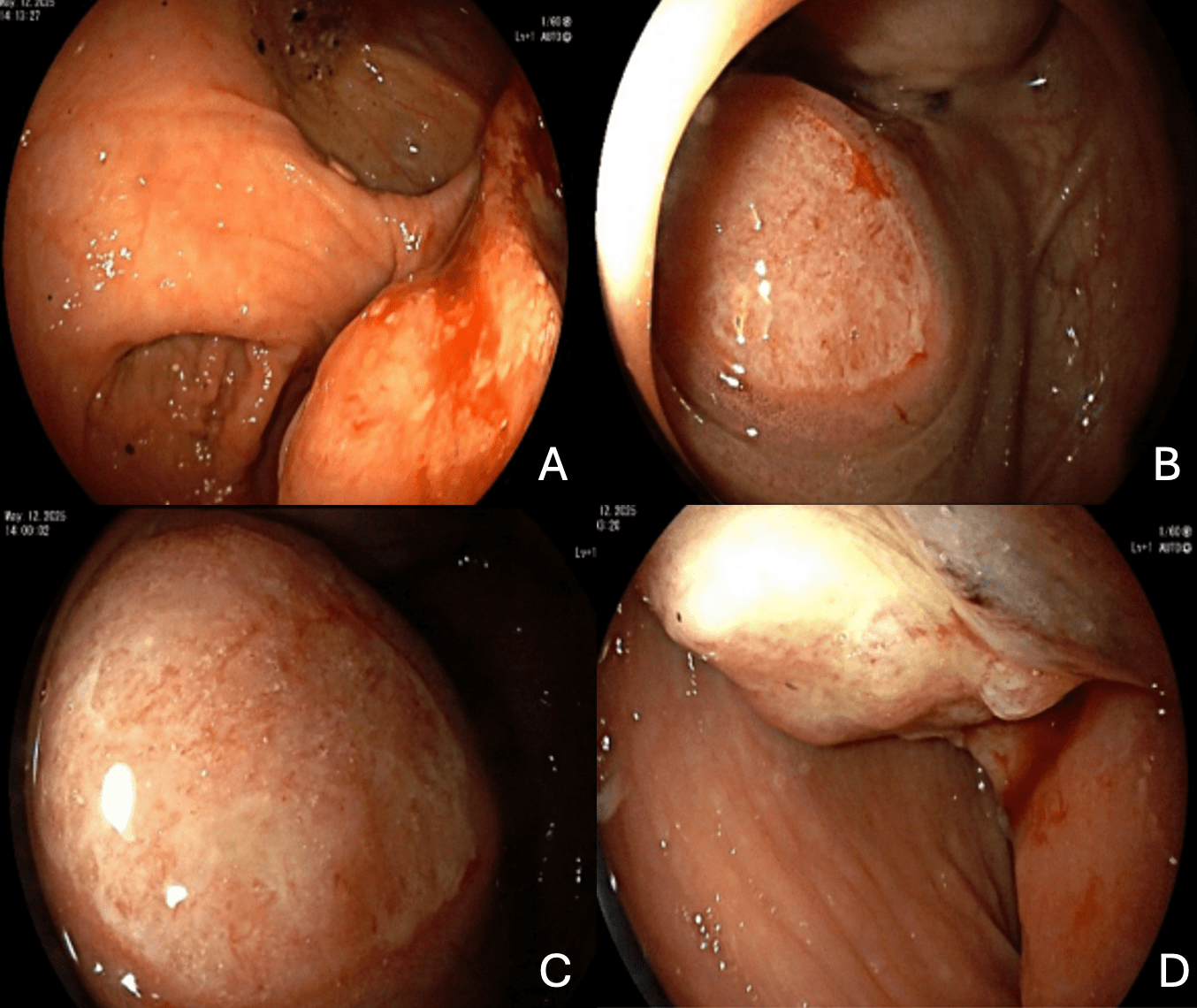Tuesday Poster Session
Category: Colon
P4686 - Unusual Presentation of Recurrent Ovarian Cancer With Colonic Metastasis
Tuesday, October 28, 2025
10:30 AM - 4:00 PM PDT
Location: Exhibit Hall

Zaid Al Momani, MD
University of Missouri - Kansas City School of Medicine
Kansas City
Presenting Author(s)
Zaid Al Momani, MD1, Zain Al-Momani, MD1, Laith Al Momani, MD1, Mohamed Ahmed, MD1, Khaled Al-Momani, MD2
1University of Missouri - Kansas City School of Medicine, Kansas City, MO; 2Jordan University of Science and Technology, Irbid, Irbid, Jordan
Introduction: Ovarian cancer metastasis to the colon is a rare and unusual entity. We report a case of Ovarian cancer recurrence presenting as fungating masses on colonoscopy following initial surgical resection and management.
Case Description/
Methods: A 34-year-old female with past medical history of serous carcinoma of the ovary status post resection and aromatase inhibitor management due to chemotherapy refusal 7 years prior presented with symptoms of fatigue and shortness of breath. Laboratory workup was significant for severe iron deficiency anemia (IDA) and elevated CA-125. Gastroenterology was consulted for work up of IDA. Computed tomography (CT) of the abdomen/pelvis with intravenous contrast demonstrated multiple masses in the pelvis with narrowing of the distal colon. Colonoscopy was done revealing two fungating masses; one large near-obstructing mass in the distal sigmoid colon; and the other in the cecum (Figure 1). Biopsies returned confirming metastatic ovarian carcinoma. Colorectal surgery and Oncology follow up were established for further management.
Discussion: Ovarian cancer most commonly metastasizes to the peritoneum, omentum and, less frequently, to distant organs such as the liver and lungs. Direct colonic involvement, particularly as intraluminal fungating masses, is exceedingly rare and has only been described in a limited number of cases. In this patient, the colonic metastasis presented insidiously, manifesting as severe symptomatic iron deficiency anemia that prompted gastrointestinal workup. This case highlights the importance of maintaining a high index of suspicion for gastrointestinal metastases in patients with a prior history of ovarian carcinoma who present with unexplained anemia, fatigue, or changes in bowel habits. While extrinsic compression is more typical, direct mucosal invasion or intraluminal metastasis should remain in the differential. Early endoscopic evaluation can play a critical role in diagnosis and facilitate timely multidisciplinary management. This underscores the need for vigilant long-term surveillance in patients with treated ovarian cancer, even years after initial therapy.

Figure: Figure 1: Image A: Endoscopic image showing a large mass in the cecum. Images B,C, and D: Endoscopic images showing a large near obstructing mass in the distal sigmoid.
Disclosures:
Zaid Al Momani indicated no relevant financial relationships.
Zain Al-Momani indicated no relevant financial relationships.
Laith Al Momani indicated no relevant financial relationships.
Mohamed Ahmed indicated no relevant financial relationships.
Khaled Al-Momani indicated no relevant financial relationships.
Zaid Al Momani, MD1, Zain Al-Momani, MD1, Laith Al Momani, MD1, Mohamed Ahmed, MD1, Khaled Al-Momani, MD2. P4686 - Unusual Presentation of Recurrent Ovarian Cancer With Colonic Metastasis, ACG 2025 Annual Scientific Meeting Abstracts. Phoenix, AZ: American College of Gastroenterology.
1University of Missouri - Kansas City School of Medicine, Kansas City, MO; 2Jordan University of Science and Technology, Irbid, Irbid, Jordan
Introduction: Ovarian cancer metastasis to the colon is a rare and unusual entity. We report a case of Ovarian cancer recurrence presenting as fungating masses on colonoscopy following initial surgical resection and management.
Case Description/
Methods: A 34-year-old female with past medical history of serous carcinoma of the ovary status post resection and aromatase inhibitor management due to chemotherapy refusal 7 years prior presented with symptoms of fatigue and shortness of breath. Laboratory workup was significant for severe iron deficiency anemia (IDA) and elevated CA-125. Gastroenterology was consulted for work up of IDA. Computed tomography (CT) of the abdomen/pelvis with intravenous contrast demonstrated multiple masses in the pelvis with narrowing of the distal colon. Colonoscopy was done revealing two fungating masses; one large near-obstructing mass in the distal sigmoid colon; and the other in the cecum (Figure 1). Biopsies returned confirming metastatic ovarian carcinoma. Colorectal surgery and Oncology follow up were established for further management.
Discussion: Ovarian cancer most commonly metastasizes to the peritoneum, omentum and, less frequently, to distant organs such as the liver and lungs. Direct colonic involvement, particularly as intraluminal fungating masses, is exceedingly rare and has only been described in a limited number of cases. In this patient, the colonic metastasis presented insidiously, manifesting as severe symptomatic iron deficiency anemia that prompted gastrointestinal workup. This case highlights the importance of maintaining a high index of suspicion for gastrointestinal metastases in patients with a prior history of ovarian carcinoma who present with unexplained anemia, fatigue, or changes in bowel habits. While extrinsic compression is more typical, direct mucosal invasion or intraluminal metastasis should remain in the differential. Early endoscopic evaluation can play a critical role in diagnosis and facilitate timely multidisciplinary management. This underscores the need for vigilant long-term surveillance in patients with treated ovarian cancer, even years after initial therapy.

Figure: Figure 1: Image A: Endoscopic image showing a large mass in the cecum. Images B,C, and D: Endoscopic images showing a large near obstructing mass in the distal sigmoid.
Disclosures:
Zaid Al Momani indicated no relevant financial relationships.
Zain Al-Momani indicated no relevant financial relationships.
Laith Al Momani indicated no relevant financial relationships.
Mohamed Ahmed indicated no relevant financial relationships.
Khaled Al-Momani indicated no relevant financial relationships.
Zaid Al Momani, MD1, Zain Al-Momani, MD1, Laith Al Momani, MD1, Mohamed Ahmed, MD1, Khaled Al-Momani, MD2. P4686 - Unusual Presentation of Recurrent Ovarian Cancer With Colonic Metastasis, ACG 2025 Annual Scientific Meeting Abstracts. Phoenix, AZ: American College of Gastroenterology.
